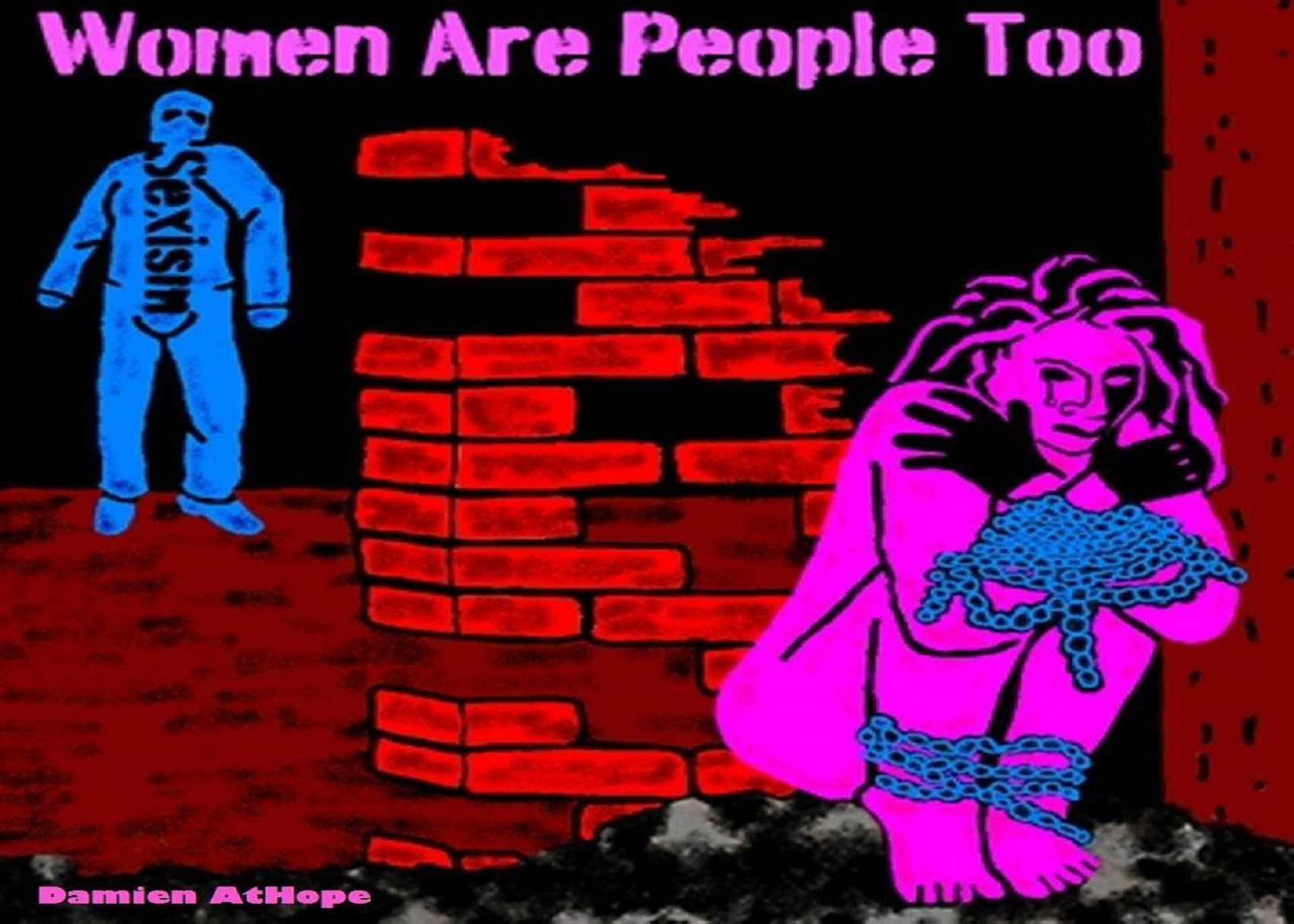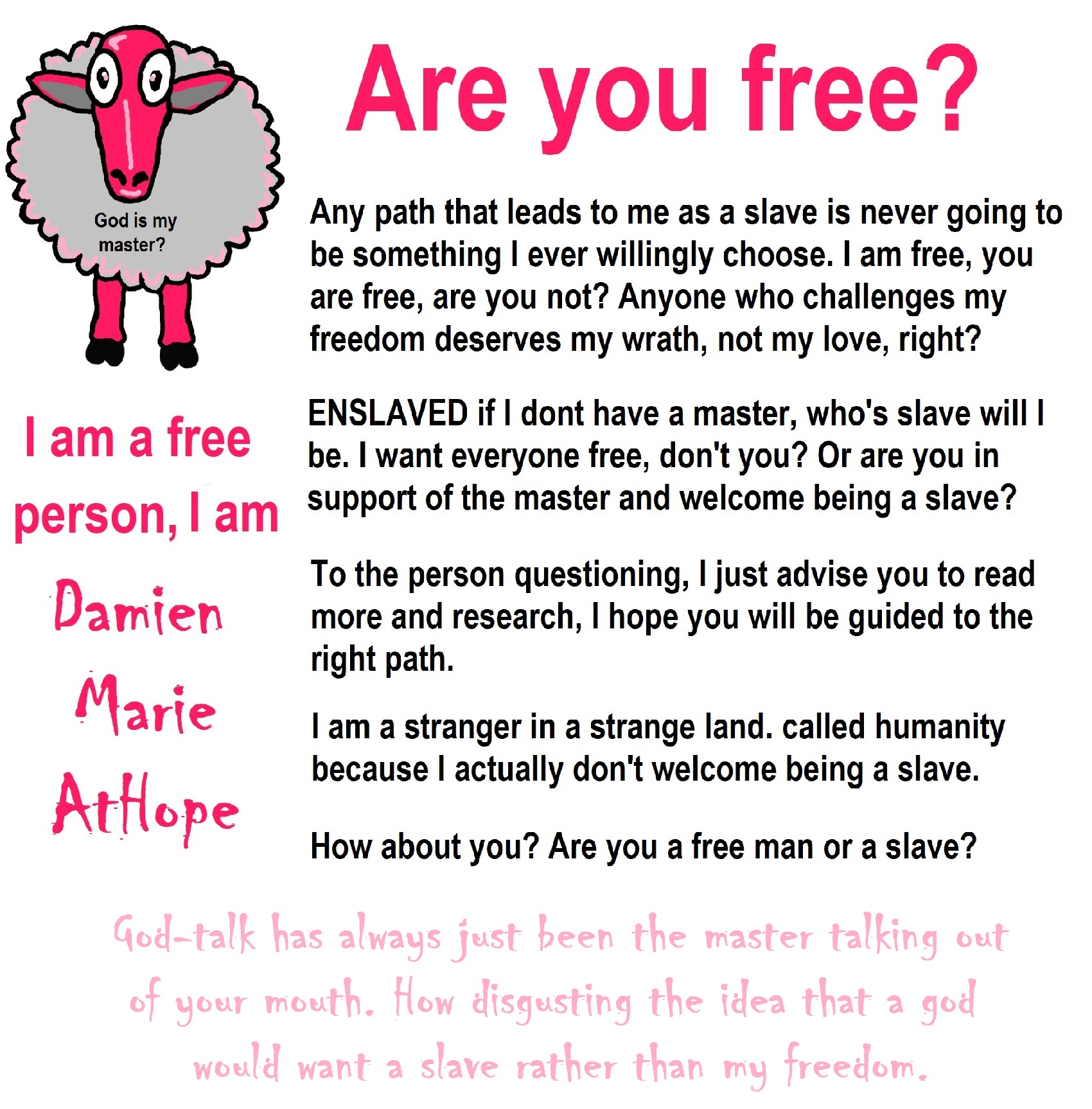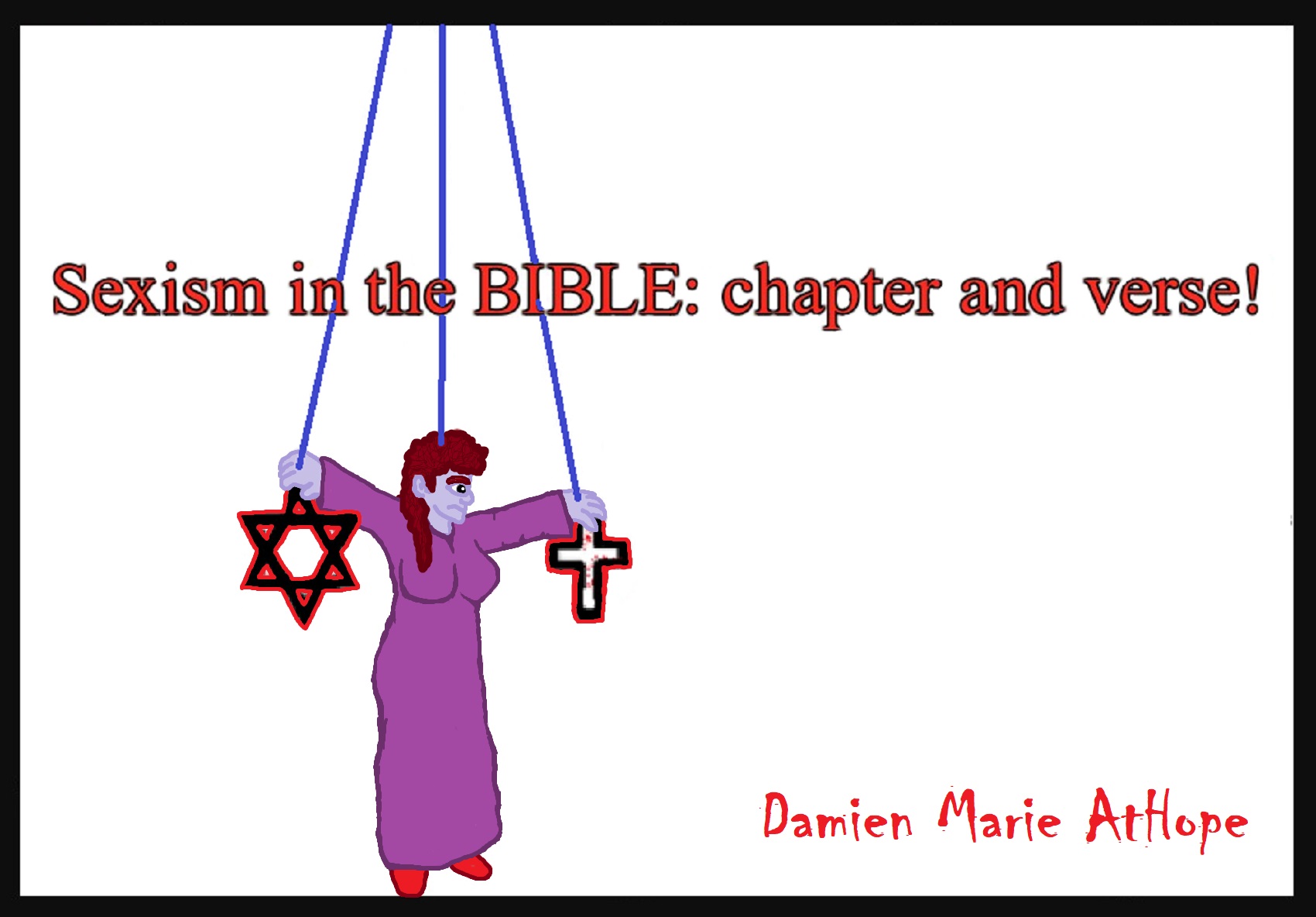
“Sexism in the BIBLE”
Sexism in Judaism (old Testament)
Genesis 3:16 Says that all women must suffer great pains during child-birth due to Eve eating the fruit of knowledge. (As if it is somehow just those humans should not pay for their ancestor’s sins nor is a woman dying in labor somehow befitting of a crime she did not commit.) The verse finishes of by saying a husband shall “rule” over his woman, stripping us off all power in between the sexes.
Genesis 19:8 Tells of a man named Lot who offers his daughters to a crowd of would be angel rapers. Later, Lot impregnated his own daughters after God kills his wife for simply looking back at the remains of her city.
Genesis 38:16-24 Tells a very interesting story of a man named Judah whom lived with his widowed daughter in law. His daughter in law was grieving and wearing the veils of mourning which Judah (a rather stupid man) mistook for the clothing of a prostitute. He ended up impregnating his daughter in law and she left the city. On a later date Judah sees the young woman again and demanded she be burned for being a prostitute (I like how only the woman is punished when THEY BOTH engaged in the sexual act). It wasn’t until Judah recognized the woman as his daughter in law and she was with his child, which he decided not to kill her. Basically, Judah can commit incest, use a prostitute (in his mistaken perception), and impregnate a MUCH younger woman, yet he thinks she is the one deserving of death.
Exodus 21:3-4 Says that if a male slave is given a wife by his master (regardless of how long they are wed, how much they love each other or if they have kids) he cannot leave servanthood with his wife or children. The woman and children are merely property of the master and their personal happiness or sanctity of family doesn’t matter.
Exodus 21:7 God not only sanctions selling ones daughter into slavery, but he also gives out laws on how it should be done.
Exodus 21:10 God ordains men taking several wives and even sets up laws as to how multiple wives should be handled.
Leviticus 12:1-8 Explains that a woman has to be purified after giving birth because she is “unclean”. It goes on to say that birthing a male is cleaner than birthing a female, hence a mother must purify TWICE as long when having a daughter. This is BLATANT sexism from the point of birth. A woman is dirty simply for being a woman; this is obviously very biased and chauvinistic.
Leviticus 15:19-30 Explains that a woman having her menstruation must be avoided to the point of not even touching what she has touched. It is quite curious that women are punished for simply having a biological function that “God” claims to have created. What is so just about vilifying what you created?
Leviticus 18:19 Goes onto say that even LOOKING at a menstruating woman is wrong.
Leviticus 19:20 Says that if a man has sex with a slave or betrothed woman he must then “scourge” her. Scourging is a term for a severe flogging or whipping. I find it quite curious that the woman shall be punished to the point of a beating for such an occurrence, yet the man gets to go free for the deed.
Leviticus 21:9 Explains that unchaste daughters of priests must be burnt to death. What about his unchaste sons? Of course this isn’t even answered in the Torah, we are to assume yet again that men have the power to do as they wish and a woman must suffer the punishment for BOTH of them.
Leviticus 27:3-7 God places a dollar value on human life; with women worth less than men.
Numbers 1:2 Is the basis for the sexism that remains rampant today. In this verse Moses takes a poll of all the men who are able to fight in war, women aren’t even counted in the census. Apparently back then, just like today, us women are considered the weaker species and unable to battle. (Let’s not forget that during the time the Pentateuch was written women in Pagan cultures were FEARED and revered as the more powerful species. It is because of this patriarchal religion and it’s offshoots that we have been reduced to cowering sub-humans.)
Numbers 30:3-16 A woman can’t make a vow unless her husband allows it.
Numbers 31: 14-18 Moses tells his men to kill all the males, non-virginal women, elderly and children of the Midianite tribe. Of course, the virgin women are kept for raping. If you read later down in the scripture God states that the Jews cannot even marry a Midianite woman (with exception to Moses). Hence these women who were captured were repeatedly raped and impregnated and they weren’t even allowed a marital status in which to protect them.
Deuteronomy 20:13-15 Kill all the men and boys in the cities that God “delivers into your hands,” but keep the women for raping.
Deuteronomy 21:11-14 If you see a pretty woman among the captives then just take her home and “go in unto her.”
Deuteronomy 22:5 Women that wear men’s clothing are an “abomination unto the Lord.”
Deuteronomy 22:13-22 Women, be sure to keep the tokens of your virginity. Otherwise the men of your city may stone you to death. This does not apply to men though, of course. What is interesting to note here is the actual wording, it says: “that if a man hateth his wife he may say she did not have the tokens of her virginity”. Since there is no way a woman can truly prove she had a hymen upon marriage the word rests on the husband and she can be disposed of simply when he tires of her.
Deuteronomy 22:23-24 is one of the cruelest and sexist passages of the Torah. It says that women who are raped and fail to “cry out loud” in a populated area are most likely enjoying the attack should be killed.
Deuteronomy 22:28-2 A rapist must buy his victim from her father for 50 shekels. Is this supposed to be some type of retribution? What about the victim here, what if she doesn’t want to marry a pig who raped her? All that matters is her father receives payment for his “property”.
Deuteronomy 25:11-12 Says that we must cut off a woman’s hand if she touches the “secrets” of a man who is fighting with her husband…“And thine eye shall not pity her.” Once again, there is no punishment for the man she touched, only the woman.
Esther 1:22 For he sent letters into all the king’s provinces, into every province according to the writing thereof, and to every people after their language, that every man should bear rule in his own house, and that [it] should be published according to the language of every people.
Ecclesiastes 7:26 I find bitterer than death the woman whose heart is snares and nets, and her hands as bands: whoso please God shall escape from her; but the sinner shall be taken by her. (Women can be source of evil for men. Men source of evil for women? — doesn’t say)
Job 25:4 How then can man be justified with God? Or, how can he be clean that is born of a woman?
In The Talmud (Women are like a piece of meat, husbands may take them as they please)
“a man may do whatever he pleases with his wife [at intercourse]: A parable; Meat which comes from the abattoir, may be eaten salted, roasted, cooked or seethed; so with fish from the fishmonger.” – 1962 Soncino Bablyonian Talmud, Nadarim 20b
Sexism in Christianity (New Testament)
1 Corinthians 11:2-10 “For if a wife will not cover her head, then she should cut her hair short. But since it is disgraceful for a wife to cut off her hair or shave her head, let her cover her head. For a man ought not to cover his head, since he is the image and glory of God, but woman is the glory of man. 8 For man was not made from woman, but woman from man. Neither was man created for woman, but woman for man. That is why a wife ought to have a symbol of authority on her head.“
1 Corinthians 11:3 “the head of every man is Christ; and the head of the woman is the man.”
1 Corinthians 11:7 – 9 “For a man is the image and glory of God: but the woman is the glory of the man. For the man is not of the woman; but the woman of the man. Neither was the man created for the woman; but the woman for the man.”
1 Corinthians 14:34 – 35 “Let your women keep silence in the churches: for it is not permitted unto them to speak; but [they are commanded] to be under obedience. In addition, if they will learn anything, let them ask their husbands at home: for it is a shame for women to speak in the church.”
Colossians 3:18 “Wives, submit yourselves unto your own husbands, as it is fit in the Lord.”
Ephesians 5:22 – 25 “Wives, submit yourselves unto your own husbands, as unto the Lord. For the husband is the head of the wife, even as Christ is the head of the church: and he is the savior of the body. Therefore as the church is subject unto Christ, so let the wives be to their own husbands in everything.”
1 Peter 3:1 -3 “Likewise, ye wives, [be] in subjection to your own husbands; that, if any obey not the word, they also may without the word be won by the conversation of the wives; while they behold your chaste conversation [coupled] with fear. Whose adorning let it not be that outward [adorning] of plaiting the hair, and of wearing of gold, or of putting on of apparel.”
1 Peter 3:5 -7 “For after this manner in the old-time the holy women also, who trusted in God, adorned themselves, being in subjection unto their own husbands: Even as Sara obeyed Abraham, calling him lord: whose daughters ye are, as long as ye do well, and are not afraid with any amazement. Likewise, ye husbands, dwell with [them] according to knowledge, giving honor unto the wife, as unto the weaker vessel, and as being heirs together of the grace of life; that your prayers be not hindered.”
Revelation 14:3-4 “No one could learn that song except the hundred and forty-four thousand who had been redeemed from the earth. It is these who have not defiled themselves with women, for they are chaste.”
Romans 7:2 “For the woman who hath a husband is bound by the law to her husband as long as he lives; but if the husband be dead, she is loosed from the law of her husband.”
1 Timothy 2:9 – 15 “In like manner also, those women adorn themselves in modest apparel, with shame faceless and sobriety; not with braided hair, or gold, or pearls, or costly array; but (which become women professing godliness) with good works. Let the woman learn in silence with all subjection. But I suffer not a woman to teach, nor to usurp authority over the man, but to be in silence. For Adam was first formed, then Eve. And Adam was not deceived, but the woman being deceived was in the transgression. Notwithstanding she shall be saved in childbearing, if they continue in faith and charity and holiness with sobriety.”
Titus 2:4-9 “Train the young women to be submissive to their husbands, that the word of God may not be discredited.”
Reference 1
Terrible Parts Of The Bible
“The sexism begins at the very beginning of the Bible where man is crated first (the implication being as he’s more important). Woman on the other hand is created from a small part of man’s body (his rib) as “a help” for man (Genesis 2:18). The standard argument to justify sexism for centuries quoted Genesis claiming God himself intended women to solely attend the needs of men. Just to make it clear when Adam and Eve are banished from Eden (note how in the story Eve is the guilty one while Adam is innocent, further justification for sexism) as punishment god declares that Adam “shall rule over thee”. (Genesis 3:16) This we have the beginning of the justification for the second class treatment of women. It only gets worse. Women are not to have any influence; in fact it is preferable that they do not even speak. 1st Corinthians (14:34-5) says “Let your women keep silence in the churches: for it is not permitted unto them to speak: but to be under obedience, as also saith the law. And if they will learn any thing, let them ask their husbands at home: for it is a shame to speak in the church.” So not only should they not speak but they should also obey their husbands (the only cases where I have heard the use of obedience in the house is for children and dogs). They should also be kept ignorant of anything their husband doesn’t want them to know. Way to go Bible on degrading the status of half the world’s population! Just in case I’m using an extreme or obscure example, I’ll give more examples. Ephesians 5:22-5 “Wives submit yourselves unto your husbands, as unto the Lord. For the husband is the head of the wife, even as Christ is the head of the church.” So your husband is like God and should be obeyed as such. This arrogance is clear proof that the Bible was man-made. Colossians 3:18 also declares “Wives, submit yourselves unto your husbands, as it is fit in the Lord.” So hear that ladies, God is telling you to do everything your husband tells you. This is not all; in fact I’m only getting going. 1st Timothy 2:11-5 says “Let the woman learn in silence with all subjection. But I suffer not a woman to teach, nor to usurp authority over the man, but to be in silence.” This is probably the most offensive and sexist comment of them all. It combines forbidding women to speak, keeping them in subjugation (according to the dictionary this means to bring under control or to enslave), declaring they can never be above man (presumably then always beneath him) and tops it off by proclaiming they have nothing worth listening to. Then there is Romans 7:2 which says “For the woman which hath an husband is bound by the law to her husband so long as he liveth.” St Peter (the one who founded the Christian Church) said (1st Peter 3:1-3) “ye wives, be in subjugation to your own husbands.” This is a practice the Church continues to promote to this day. I could go on quoting all night, but I’ll save you the time and give summaries. There is the view that women are inherently unclean. Leviticus 12:2-5 says that when a woman gives birth to a boy she is unclean for seven days. But if she gives birth to a girl she is unclean for two weeks. It is not explained what is unclean about a perfectly normal natural act. Even worse, during a woman’s monthly period a woman is unclean but so is anyone who touches her (Leviticus 15:19). If periods are so bad then why did create them? This sounds more like immature boys than the teaching of an all-powerful and all-loving God. Then there is just the absurd, like the verse which says that it is an “abomination” (Deuteronomy 22:5) for a woman to wear clothes that men wear (trousers for example). Then there is Leviticus 27:3-7 which declares women are not equal to men. In fact they are only three-fifths the value of men. (Just in case some try to argue that women were treated badly in the past but then Jesus made this right, most of these quotes are from the New Testament) While people often comment on the poor treatment of women in Islam, many do not realize that Bible shows just as little respect towards women. They are blamed for many problems even when it does not seem to be their blame. They are more or less written out of the Bible with all the main characters being male while the women are rarely even named. They treated as inferior to men, discouraged even from speaking, condemned as unclean and forced to obey their husband regardless of their own will. I cannot reconcile a supposedly loving, caring God with one who is so blatantly sexist. This is one of many problems I have with the Bible.” ref
Ambivalent Sexism and Religion: Connected Through Values
Abstract
“Sexist attitudes do not exist in a limbo; they are embedded in larger belief systems associated with specific hierarchies of values. In particular, manifestations of benevolent sexism (Glick and Fiske 1996, 1997, 2001) can be perceived as a social boon, not a social ill, both because they are experienced as positive, and because they reward behaviors that maintain social stability. One of the strongest social institutions that create and justify specific hierarchies of values is religion. In this paper, we examine how the values inherent in religious beliefs (perhaps inadvertently) propagate an unequal status quo between men and women through endorsement of ideologies linked to benevolent sexism. In a survey with a convenience sample of train passengers in Southern and Eastern Poland (N = 180), we investigated the relationship between Catholic religiosity and sexist attitudes. In line with previous findings (Gaunt 2012; Glick et al. 2002a; Taşdemir and Sakallı-Uğurlu 2010), results suggest that religiosity can be linked to endorsement of benevolent sexism. This relationship was mediated in our study by the values of conservatism and openness to change (Schwartz 1992): religious individuals appear to value the societal status quo, tradition, and conformity, which leads them to perceive women through the lens of traditional social roles. Adhering to the teachings of a religion that promotes family values in general seems to have as its byproduct an espousal of prejudicial attitudes toward specific members of the family.” ref
The roles of women in Christianity
“The roles of women in Christianity can vary considerably today as they have varied historically since the third century New Testament church. This is especially true in marriage and in formal ministry positions within certain Christian denominations, churches, and parachurch organizations. Many leadership roles in the organized church have been restricted to males. In the Roman Catholic and Orthodox churches, only men may serve as priests or deacons; only males serve in senior leadership positions such as pope, patriarch, and bishop. Women may serve as abbesses.” ref
“Most mainstream Protestant denominations are beginning to relax their longstanding constraints on ordaining women to be ministers, though some large groups, most notably the Southern Baptist Convention, are tightening their constraints in reaction. Most all Charismatic and Pentecostal churches were pioneers in this matter and have embraced the ordination of women since their founding. Christian traditions that officially recognize saints as persons of exceptional holiness of life do list women in that group. Most prominent is Mary, mother of Jesus who is highly revered throughout Christianity, particularly in Roman Catholicism where she is considered the “Mother of God”. Both the apostles Paul and Peter held women in high regard and worthy of prominent positions in the church, though they were careful not to encourage anyone to disregard for the New Testament household codes, also known as New Testament Domestic Codes or Haustafelen.” ref
“They were efforts by the apostles Paul and Peter to encourage the brand-new first Century Christians how to obey the Patria Potestas (lit., “Rule of the Fathers”) of Greco-Roman law. The New Testament written record of their efforts in this regard are found in Colossians 3:18-4:1, Ephesians 5:22-6:9, 1 Peter 2:13-3:7, Titus 2:1-10 and 1 Timothy 2:1ff., 3:1, 3:8, 5:17, and 6:1. Christianity emerged from Judaism and in the Greco-Roman culture, patriarchal societies that placed men in positions of authority in marriage, society and government. The New Testament only records males being named among the 12 original apostles of Jesus Christ. Women were the first to discover the Resurrection of Christ. Since clerical (clergy) ordination and the notion of priesthood post-dates the New Testament, its 27 books contain no specifications for such ordination or distinction.” ref
“Subsequently, the early church within Catholicism developed a monastic tradition which included the institution of the convent through which women, developed religious orders of sisters and nuns, an important ministry of women which has continued to the present day in the establishment of schools, hospitals, nursing homes and monastic settlements. In one of her several books, Linda Woodhead notes the earliest Christian theological basis for forming a position on the roles of women is in the Book of Genesis where readers are drawn to the conclusion that women are beneath men and “that the image of God shines more brightly” in men than women.” ref
The following New Testament passages and more recent theological notions have contributed to the interpretation of roles of women in Christianity through the centuries:
- “Women will be saved through bearing children, if she continues in faith and love and holiness, with modesty.”[1 Timothy 2:15]
- “The rule remains with the husband, and the wife is compelled to obey him by God’s command. He rules the home and the state, wages wars, and defends his possessions…. The woman, on the other hands, is like a nail driven into the wall. She sits at home…. She does not go beyond her most personal duties.” (Luther, Lectures)” ref
- “Properly speaking, the business of woman, her task and function, is to actualize the fellowship in which man can only precede her, stimulating, leading, inspiring.” (Karl Barth, Church Dogmatics)” ref
- “I believe that ultimately the effective authority of Scripture to govern our lives is at stake in this controversy. The issue is not whether we say we believe the Bible is the Word of God or that we believe it is without error, but the issue is whether we actually obey it when its teachings are unpopular and conflict with the dominant viewpoints in our culture. If we do not obey it, then the effective authority of God to govern His people and His church through His Word has been eroded, concludes Grudem.” — Wayne Grudem (emphases original), Evangelical Feminism and Biblical Truth” ref
- Christian leaders through history have been patriarchal, taking names which underscore male leadership in the church. These include “father”, “‘abbot’ (abba = father)”, and “‘pope’ (papa = father)”. Linda Woodhead notes that “Such language … excludes women from the exercise of such roles”. She also notes a sentiment in 1 Corinthians which “exemplif[ies] a pattern of Christianity of all varieties”, where Paul “explains that women should be veiled in church to signal their subordination to men because ‘the head of every man is Christ and the head of a woman is her husband’, and that ‘women should keep silence in the churches. For they are not permitted to speak, but should be subordinate, as even the law says.” ref
- Conservative Christian theologian Gilbert Bilezikian points out that throughout the Old Testament era and beyond, just as God had prophesied, men continued to rule over women in a patriarchal system which he sees as being a “compromise” or “accommodation” between sinful reality and the divine ideal. The coming of Jesus is understood as moving forward from Old Testament patriarchy, re-instituting full equality of gender roles, as succinctly articulated in Galatians 3:28. ” ref
- New Testament passages, such as “22Wives, be subject to your husbands, as to the Lord. 23For the husband is the head of the wife as Christ is the head of the church, his body, and is himself its Savior. 24As the church is subject to Christ, so let wives also be subject in everything to their husbands”[Eph. 5:22-24]” ref
- Gilbert Bilezikian writes that “the poison of hierarchy generated by the fall (of mankind) had permeated relationships to such an extent that those very disciples Jesus was training in the ways of servanthood insisted on substituting hierarchy for servanthood. They kept competing among themselves for the highest status and for positions of preeminence. Bilezikian continues: “To settle the issue once for all times, Jesus sharply delineated the basic difference between social organization in the secular world and in the Christian community”. He concludes that “Consequently, there is no mandate and no allowance in the New Testament for one adult believer to hold authority over another adult believer. Instead, the overall rule calls for mutual submission among all believers out of reverence for Christ”.[Eph. 5:21]” ref
- Complementarians teach that male priority and headship (positional leadership) were instituted prior to the Fall[Gen. 1-2] and that the decree in Genesis 3:16 merely distorted this leadership by introducing “ungodly domination.” Complementarians teach that the male leadership seen throughout the Old Testament (i.e., the patriarchs, priesthood and monarchy) was an expression of the creation ideal, as was Jesus’ selection of 12 male apostles and New Testament restrictions on church leadership to men only.[1 Tim. 2:11-14]” ref
- Wayne Grudem takes exception to these egalitarian arguments, insisting that Christ’s maleness was theologically necessary; he also alleges that egalitarians are increasingly advocating that God should be thought of as “Mother” as well as “Father”, a move which he sees as theologically liberal. The Christian doctrine of the Trinity has become a major focus of the contemporary gender debate, specifically in relation to 1 Cor. 11:3. In 1977, George W. Knight III argued in a book about gender roles that the subordination of women to men is theologically analogous to the subordination of the Son to the Father in the Trinity. A vigorous debate has ensued, with some egalitarians moving towards the idea that there is “mutual dependence” within the Trinity, including “subordination of the Father to the Son”, which must be reflected in gender role relations. Wayne Grudem has countered this by asserting that mutual submission in the Trinity cannot be supported by scripture and church history.” ref
- Bible verses from Paul’s letters which support the idea that women are to have a different or submissive role to men:
- “A woman should learn in quietness and full submission. I do not permit a woman to teach or to assume authority over a man; she must be quiet. For Adam was formed first, then Eve. And Adam was not the one deceived; it was the woman who was deceived and became a sinner. But women will be saved through childbearing—if they continue in faith, love and holiness with propriety.”[1Tim. 2:11-15]” ref
- “Submit to one another out of reverence for Christ. Wives, submit yourselves to your own husbands as you do to the Lord. For the husband is the head of the wife as Christ is the head of the church, his body, of which he is the Savior. Now as the church submits to Christ, so also wives should submit to their husbands in everything. Husbands, love your wives, just as Christ loved the church and gave himself up for her to make her holy,”[Eph. 5:21-27]” ref
- “3But I want you to realize that the head of every man is Christ, and the head of the woman is man, and the head of Christ is God. 4Every man who prays or prophesies with his head covered dishonors his head. 5But every woman who prays or prophesies with her head uncovered dishonors her head—it is the same as having her head shaved. 6For if a woman does not cover her head, she might as well have her hair cut off; but if it is a disgrace for a woman to have her hair cut off or her head shaved, then she should cover her head. 7 A man ought not to cover his head, since he is the image and glory of God; but woman is the glory of man. 8For man did not come from woman, but woman from man; 9 neither was man created for woman, but woman for man. 10It is for this reason that a woman ought to have authority over her own head, because of the angels. 11Nevertheless, in the Lord woman is not independent of man, nor is man independent of woman. 12For as woman came from man, so also man is born of woman. But everything comes from God. 13Judge for yourselves: Is it proper for a woman to pray to God with her head uncovered? 14Does not the very nature of things teach you that if a man has long hair, it is a disgrace to him, 15but that if a woman has long hair, it is her glory? For long hair is given to her as a covering. 16If anyone wants to be contentious about this, we have no other practice—nor do the churches of God.”[1Cor. 11:3-16 NIV]” ref
“New Testament scholar Frank Stagg considers verse 10 above as being “quite enigmatic, where a woman’s being veiled is “because of the angels”. In his book, he suggests clues to the intention. He concludes his comments on this passage by saying that “The problems here are many. What is Paul’s authority or source for the hierarchy: God, Christ, man, woman? … What importance is there to a head covering in worship? Are veils binding upon women today? What about the subordination of woman (or wife) to man (or husband)? What about the angels? What about the teaching of nature? Is custom in v.16 binding upon Christian conscience today?” p.177″ ref
- “As in all the churches of the saints, the women should keep silence in the churches. For they are not permitted to speak but should be subordinate, as even the law says. If there is anything they desire to know, let them ask their husbands at home. For it is shameful for a woman to speak in church.”[1Cor. 14:33-35]” ref
- Complementarians have traditionally held that Christian ministers ought to be men, because of the need to represent Jesus Christ, who was the “Son” of God, and incarnate as a male human being. A related position is that while both male and female were made in the image of God, the woman shares in the divine image through the man because she was created out of him, and is his “glory.”[1 Cor 11:7-8]” ref
“To us a priest is primarily a representative, a double representative, who represents us to God and God to us… We have no objection to a woman doing the first: the whole difficulty is with the second. But why? … Suppose the reformer stops saying that a good woman may be like God and begins saying that God is like a good woman. Suppose he says that we might just as well pray to ‘Our Mother which art in Heaven’ as to ‘Our Father’. Suppose he says that the Incarnation might just as well have taken a female as a male form, and the Second Person of the Trinity be as well called the Daughter as the Son. Suppose, finally, that the mystical marriage were reversed, that the Church were the Bridegroom and Christ the Bride. All this, as it seems to me, is involved in the claim that a woman can represent God as a priest does. — C. S. Lewis, Priestesses in the Church? 1948″ ref
“Wayne Grudem takes exception to these egalitarian arguments, insisting that Christ’s maleness was theologically necessary; he also alleges that egalitarians are increasingly advocating that God should be thought of as “Mother” as well as “Father”, a move which he sees as theologically liberal. The Christian doctrine of the Trinity has become a major focus of the contemporary gender debate, specifically in relation to 1 Cor. 11:3. In 1977, George W. Knight III argued in a book about gender roles that the subordination of women to men is theologically analogous to the subordination of the Son to the Father in the Trinity. Australian theologian Kevin Giles has more recently responded that complementarians have “reinvented” the doctrine of the Trinity to support their views of men and women, suggesting that some complementarians have adopted a heretical view of the Trinity similar to Arianism. A vigorous debate has ensued, with some egalitarians moving towards the idea that there is “mutual dependence” within the Trinity, including “subordination of the Father to the Son”, which must be reflected in gender role relations. Wayne Grudem has countered this by asserting that mutual submission in the Trinity cannot be supported by scripture and church history.” ref
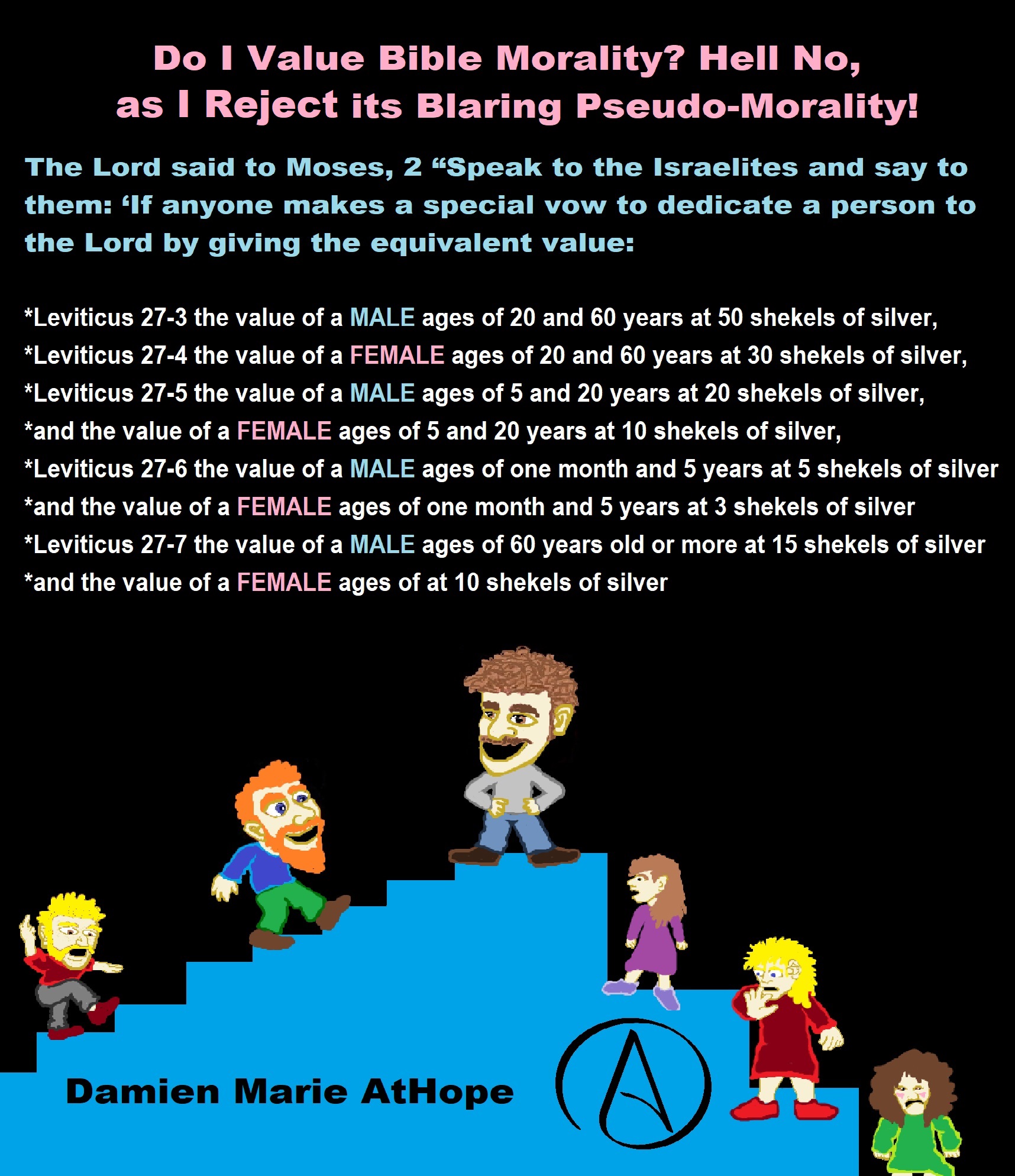

While hallucinogens are associated with shamanism, it is alcohol that is associated with paganism.
The Atheist-Humanist-Leftist Revolutionaries Shows in the prehistory series:
Show two: Pre-animism 300,000 years old and animism 100,000 years old: related to “Anarchism and Socialism”
Show tree: Totemism 50,000 years old: related to “Anarchism and Socialism”
Show four: Shamanism 30,000 years old: related to “Anarchism and Socialism”
Show five: Paganism 12,000 years old: related to “Anarchism and Socialism”
Show six: Emergence of hierarchy, sexism, slavery, and the new male god dominance: Paganism 7,000-5,000 years old: related to “Anarchism and Socialism” (Capitalism) (World War 0) Elite and their slaves!
Prehistory: related to “Anarchism and Socialism” the division of labor, power, rights, and recourses: VIDEO
Pre-animism 300,000 years old and animism 100,000 years old: related to “Anarchism and Socialism”: VIDEO
Totemism 50,000 years old: related to “Anarchism and Socialism”: VIDEO
Shamanism 30,000 years old: related to “Anarchism and Socialism”: VIDEO
Paganism 12,000 years old: related to “Anarchism and Socialism” (Pre-Capitalism): VIDEO
Paganism 7,000-5,000 years old: related to “Anarchism and Socialism” (Capitalism) (World War 0) Elite and their slaves: VIEDO
Paganism 5,000 years old: progressed organized religion and the state: related to “Anarchism and Socialism” (Kings and the Rise of the State): VIEDO
Paganism 4,000 years old: related to “Anarchism and Socialism” (First Moralistic gods, then the Origin time of Monotheism): VIEDO
I do not hate simply because I challenge and expose myths or lies any more than others being thought of as loving simply because of the protection and hiding from challenge their favored myths or lies.
The truth is best championed in the sunlight of challenge.
An archaeologist once said to me “Damien religion and culture are very different”
My response, So are you saying that was always that way, such as would you say Native Americans’ cultures are separate from their religions? And do you think it always was the way you believe?
I had said that religion was a cultural product. That is still how I see it and there are other archaeologists that think close to me as well. Gods too are the myths of cultures that did not understand science or the world around them, seeing magic/supernatural everywhere.
I personally think there is a goddess and not enough evidence to support a male god at Çatalhöyük but if there was both a male and female god and goddess then I know the kind of gods they were like Proto-Indo-European mythology.
This series idea was addressed in, Anarchist Teaching as Free Public Education or Free Education in the Public: VIDEO
Our 12 video series: Organized Oppression: Mesopotamian State Force and the Politics of power (9,000-4,000 years ago), is adapted from: The Complete and Concise History of the Sumerians and Early Bronze Age Mesopotamia (7000-2000 BC): https://www.youtube.com/watch?v=szFjxmY7jQA by “History with Cy“
Show #1: Mesopotamian State Force and the Politics of Power (Samarra, Halaf, Ubaid)
Show #2: Mesopotamian State Force and the Politics of Power
Show #3: Mesopotamian State Force and the Politics of Power (Uruk and the First Cities)
Show #4: Mesopotamian State Force and the Politics of Power (First Kings)
Show #5: Mesopotamian State Force and the Politics of Power (Early Dynastic Period)
Show #6: Mesopotamian State Force and the Politics of Power
Show #7: Mesopotamian State Force and the Politics of Power (Sargon and Akkadian Rule)
Show #9: Mesopotamian State Force and the Politics of Power (Gudea of Lagash and Utu-hegal)
Show #12: Mesopotamian State Force and the Politics of Power (Aftermath and Legacy of Sumer)

The “Atheist-Humanist-Leftist Revolutionaries”
Cory Johnston ☭ Ⓐ Atheist Leftist @Skepticallefty & I (Damien Marie AtHope) @AthopeMarie (my YouTube & related blog) are working jointly in atheist, antitheist, antireligionist, antifascist, anarchist, socialist, and humanist endeavors in our videos together, generally, every other Saturday.
Why Does Power Bring Responsibility?
Think, how often is it the powerless that start wars, oppress others, or commit genocide? So, I guess the question is to us all, to ask, how can power not carry responsibility in a humanity concept? I know I see the deep ethical responsibility that if there is power their must be a humanistic responsibility of ethical and empathic stewardship of that power. Will I be brave enough to be kind? Will I possess enough courage to be compassionate? Will my valor reach its height of empathy? I as everyone, earns our justified respect by our actions, that are good, ethical, just, protecting, and kind. Do I have enough self-respect to put my love for humanity’s flushing, over being brought down by some of its bad actors? May we all be the ones doing good actions in the world, to help human flourishing.
I create the world I want to live in, striving for flourishing. Which is not a place but a positive potential involvement and promotion; a life of humanist goal precision. To master oneself, also means mastering positive prosocial behaviors needed for human flourishing. I may have lost a god myth as an atheist, but I am happy to tell you, my friend, it is exactly because of that, leaving the mental terrorizer, god belief, that I truly regained my connected ethical as well as kind humanity.
Cory and I will talk about prehistory and theism, addressing the relevance to atheism, anarchism, and socialism.
At the same time as the rise of the male god, 7,000 years ago, there was also the very time there was the rise of violence, war, and clans to kingdoms, then empires, then states. It is all connected back to 7,000 years ago, and it moved across the world.
Cory Johnston: https://damienmarieathope.com/2021/04/cory-johnston-mind-of-a-skeptical-leftist/?v=32aec8db952d
The Mind of a Skeptical Leftist (YouTube)
Cory Johnston: Mind of a Skeptical Leftist @Skepticallefty
The Mind of a Skeptical Leftist By Cory Johnston: “Promoting critical thinking, social justice, and left-wing politics by covering current events and talking to a variety of people. Cory Johnston has been thoughtfully talking to people and attempting to promote critical thinking, social justice, and left-wing politics.” http://anchor.fm/skepticalleft
Cory needs our support. We rise by helping each other.
Cory Johnston ☭ Ⓐ @Skepticallefty Evidence-based atheist leftist (he/him) Producer, host, and co-host of 4 podcasts @skeptarchy @skpoliticspod and @AthopeMarie
Damien Marie AtHope (“At Hope”) Axiological Atheist, Anti-theist, Anti-religionist, Secular Humanist. Rationalist, Writer, Artist, Poet, Philosopher, Advocate, Activist, Psychology, and Armchair Archaeology/Anthropology/Historian.
Damien is interested in: Freedom, Liberty, Justice, Equality, Ethics, Humanism, Science, Atheism, Antiteism, Antireligionism, Ignosticism, Left-Libertarianism, Anarchism, Socialism, Mutualism, Axiology, Metaphysics, LGBTQI, Philosophy, Advocacy, Activism, Mental Health, Psychology, Archaeology, Social Work, Sexual Rights, Marriage Rights, Woman’s Rights, Gender Rights, Child Rights, Secular Rights, Race Equality, Ageism/Disability Equality, Etc. And a far-leftist, “Anarcho-Humanist.”
I am not a good fit in the atheist movement that is mostly pro-capitalist, I am anti-capitalist. Mostly pro-skeptic, I am a rationalist not valuing skepticism. Mostly pro-agnostic, I am anti-agnostic. Mostly limited to anti-Abrahamic religions, I am an anti-religionist.
To me, the “male god” seems to have either emerged or become prominent around 7,000 years ago, whereas the now favored monotheism “male god” is more like 4,000 years ago or so. To me, the “female goddess” seems to have either emerged or become prominent around 11,000-10,000 years ago or so, losing the majority of its once prominence around 2,000 years ago due largely to the now favored monotheism “male god” that grow in prominence after 4,000 years ago or so.
My Thought on the Evolution of Gods?
Animal protector deities from old totems/spirit animal beliefs come first to me, 13,000/12,000 years ago, then women as deities 11,000/10,000 years ago, then male gods around 7,000/8,000 years ago. Moralistic gods around 5,000/4,000 years ago, and monotheistic gods around 4,000/3,000 years ago.
To me, animal gods were likely first related to totemism animals around 13,000 to 12,000 years ago or older. Female as goddesses was next to me, 11,000 to 10,000 years ago or so with the emergence of agriculture. Then male gods come about 8,000 to 7,000 years ago with clan wars. Many monotheism-themed religions started in henotheism, emerging out of polytheism/paganism.
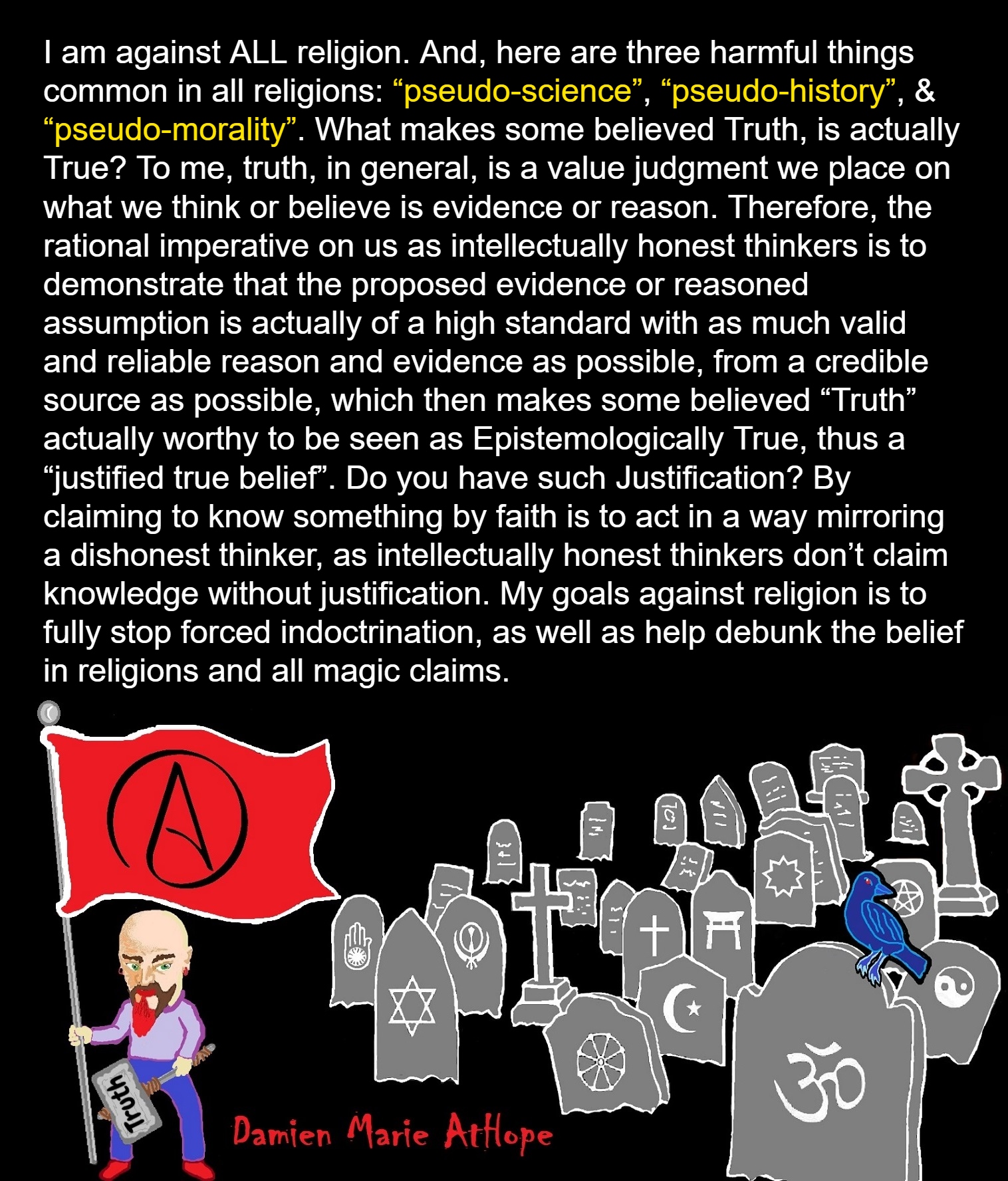

Damien Marie AtHope (Said as “At” “Hope”)/(Autodidact Polymath but not good at math):
Axiological Atheist, Anti-theist, Anti-religionist, Secular Humanist, Rationalist, Writer, Artist, Jeweler, Poet, “autodidact” Philosopher, schooled in Psychology, and “autodidact” Armchair Archaeology/Anthropology/Pre-Historian (Knowledgeable in the range of: 1 million to 5,000/4,000 years ago). I am an anarchist socialist politically. Reasons for or Types of Atheism
My Website, My Blog, & Short-writing or Quotes, My YouTube, Twitter: @AthopeMarie, and My Email: damien.marie.athope@gmail.com

